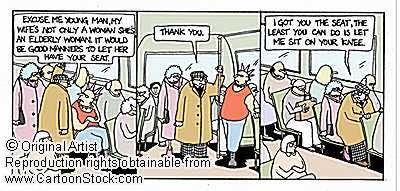
It was a situation that I met this afternoon when I’m on my way to NUS. I was taking the train from Yishun to Jurong East. When I was taking the other train towards the Clementi station, a few seconds after the train left the Jurong East station, I heard a man shouting towards an old man behind me. I was shocked by the voice. The words that used by the man was so rude. After seeing this happen, I have a few questions in my mind. Why there was no one giving the seat to the old man? Why the man can’t tolerance to the old man? How manners we are to others? As we always heard the slogan in Singapore, ”Courtesy is our way of life. Make courtesy our way of life.” Is it true?
Interesting question, isn’t it? In the Age of Rudeness, we may be losing touch with what etiquette and good manners are all about. In fact there may be those among us who haven’t experienced it.
Good manners are civilized behavior. That’s as opposed to wild behavior. Whether that was a particular rule in your household, or culture, all cultures have “rules” and they are learned, not innate. All cultures have rules and if you violate them, you’ll be excluded. Manners must be really ingrained; a matter of who you are, not how you are. The attitude must be without thinking, but the particulars require great thought. It’s always easier to revert to the feral state. There are those among us who still blurt out “thank you,” “you’re welcome,” ”excuse me,” and “May i?”But there are a lot more among us who don’t!
So, to have good manners we must learn the actions- the “trivialities of deportment” – and then stop and think when we’re with others. Then we can avoid being tactless. Avoiding being rude, has a lot to do with emotional intelligence which, like good manners, can be learned. EQ requires self-awareness and empathy – the ability to understand how your behavior affects others and their feelings. It requires a strong interface between emotions and thinking.
It’s easier to be rude and it’s harder to be polite. But what happens when everyone behaves that way? Then we have a rudeness epidemic. And how will we change that? One person at a time! As Mother Teresa said, when the house is dirty don’t complain or call a committee, pick up the broom and start sweeping.
